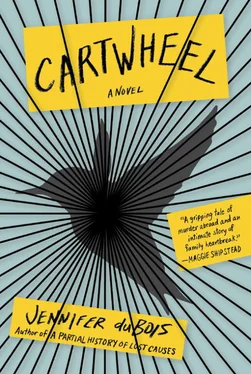Campos hit a button, and now Sebastien’s own awful voice filled the room, telling of how he had spent the entire night with Lily, how she had stayed beside him, how he was sure of it. Sebastien felt a surge of distaste for the person speaking—it was automatic and instantaneous, like a bias he knew better than to indulge but could not help feeling, for a brief panicked second, before his superego roused itself for policing. Who was that person? Did he think he sounded unconcerned? Did he think he sounded relaxed ? Did he think he sounded like he had any control over the situation—any control, even, over himself? Sebastien was sad for that kid. He was disgusted with that kid. Most of all, he was very sorry that he was now going to have to clean up that kid’s mistakes.
“But it was only a moment,” said Sebastien. His guilt was unending, stereoscopic. His guilt was like a pain so great that you stop believing it’s coming from you at all and start believing that it’s coming from the universe; it was no longer within him, it was around him. You knew this, he told himself. Remember? You knew all of this already.
“I mean, I’m not a mathematician,” said Sebastien. “I’m not Euclid.” Even as he spoke, he could hear the weakness of what he was saying—he could hear the shrillness of his indignation, the overstatement of his scoffing. “But that voicemail is, what? Thirty seconds? Are you saying she was, like, stabbing Katy while she was listening to Anna’s outgoing message? Or, like, in between sentences? Or what?”
Eduardo Campos leaned forward. He smelled medicinal, so it must be gel in his hair. Sebastien didn’t really need to have it explained to him, but still Eduardo did—more patiently than Sebastien himself would have, if their places had been reversed. “The problem,” he said—and he really made it sound like a problem, he made it sound like it was both of their problems, like it was everyone’s problem—“is that there’s nothing besides you accounting for Lily that night. Your word is all we have.”
Sebastien’s word, Campos did not seem to think he needed to mention again, was already dubious. And with the voicemail, it had been rendered null in its entirety.
“Okay, yes. As we’ve both learned, I was wrong.” Sebastien bent his head slightly, giving Campos a moment to appreciate this concession. “But that’s not really the question. The question you’re really after has nothing to do with whether I was right or wrong about that one particular moment. The question is what she did when she was out of the house. What, realistically, she could have done. If she even left the house at all. And so you’re going to tell people that she stepped out for a brief midnight murder, as one does, and then slipped back in to call her sister back in college before climbing into bed and sleeping the rest of the night next to me? Because I woke up at some point in the early morning and she was asleep next to me. And, okay, I get that you’re thinking that I’m not trustworthy and so who cares. But without showering? She didn’t use the shower. She came back from a little light impulsive murder spree and didn’t even shower? Don’t you have a way of checking that?”
“We do.” Now Campos’s expression was actually gentle. Sebastien could see that he had begun to understand that Sebastien’s confusion wasn’t genuine—that it was desperate, delusional, that he was constructing the kind of convoluted narrative people invented to make the real seem less real. “And we could have,” said Campos, “if you’d been honest with us from the beginning. But, as you undoubtedly realized even as you were speaking, we cannot now go back in time and establish whether Lily Hayes took a shower in your house several weeks ago. Alas.”
Sebastien’s mouth flooded with a tannic taste. He was beginning to realize how minor the points of dispute here were; he was beginning to see that you did not build up good credit by getting most of the story right. And, frankly, he did not question the correctness of this. It didn’t matter whether he was a liar in general, or whether the bulk of what he’d told everybody had been true. At the end of the day, he’d lied for Lily, which meant he was willing to lie for Lily, which was the only relevant fact about him in relation to this case, and possibly the only relevant fact about him in general.
“She broke up with me that night, you know. That could have been what she was talking to Anna about.”
“When?”
“When she talks about the mistake.”
“It could have been,” said Eduardo agreeably. “But we certainly have no reason to think that. Did she seem to feel that breaking up with you had been a terrible mistake?”
Sebastien said nothing.
“Look,” said Eduardo, putting his hands on the table in that oddly supplicating gesture of his. “I’m not going to tell you that being honest is your best way to help Lily. I know I’ve been saying that to you for a while, and whether you believed it or not, it was once actually true. But I’m not going to say it now, because I’m not convinced that it’s true anymore. I don’t think you can help Lily at this point. All I know for sure is that you can still hurt her. You have hurt her with this lie. You have hurt her as much as Lily has hurt herself. Because now we do not know anything with certainty.”
And then Sebastien listened while Campos listed all the things that they could no longer know with certainty. Had Lily and Sebastien actually smoked weed together? (Because she had smoked weed with somebody.) Had they actually watched Lost in Translation ? It was baffling to Sebastien, this extension of rigorous skepticism toward all the mundane things—was this the kind of movie Sebastien usually watched, and was this the amount of alcohol that Lily usually drank, and why would she have come over and spent so much time with him anyway if she was only planning on ending things afterward? Come to think of it, had Lily really even been there at all that night? As Sebastien listened, he could feel the entirety of the night unravel—he watched it erase, all the mistakes disappearing, beginning with Katy’s death and ending with Lily’s breaking up with him, or maybe the two things vanishing simultaneously, until none of it had ever happened, none of it had ever happened at all.
Or maybe, Sebastien thought, this was too ambitious. Maybe he needed a more modest request; maybe he needed only to erase Anna. He imagined Anna not coming to see him. In his mind, he unspoke their conversation, unknocked the door, undrove the taxi back to the hotel where Lily and Anna’s parents were sleeping, then woke them up.
Eduardo Campos had stopped speaking. Sebastien felt a great cistern of grief inside him. It would swallow him whole one day; one day, he knew, he would drown in it. Sometimes he wished he could walk toward it with stones in his pockets and get the whole thing over with.
“Here,” said Campos, handing Sebastien a telephone. “I assume your parents had a lawyer.”
“Seriously, what the fuck?” Andrew said to Maureen on the drive back to the hotel. It was evening, and the taxi’s headlights briefly spangled the wall of the jail. Anna had had to stay behind to talk to the lawyers.
“Maybe we should all just go home.”
Maureen did not answer.
Anna’s iPhone had been subpoenaed that afternoon; the incriminating voicemail had been produced. Anna had deleted it but apparently not deleted it enough somehow, a fact that Andrew vacillated between attributing to Anna’s technological ineptitude and to some subconscious desire of hers to do violence to her sister. He could not bear to think seriously about which was really likelier. On the message, Lily’s voice had been strange—though not strange in the same way as on the 911 call, which she would make only twelve hours later. In her call to Anna, Lily’s voice was faraway and hoarse, and too relaxed somehow. It was almost unrecognizable to Andrew, and he’d nearly said this—he’d nearly challenged the idea that it was Lily’s voice at all—but then he’d stopped himself. He was learning.
Читать дальше












